With the rise in social consciousness and emphasis on sustainability, this information is essential to know. It is my hope this article will become a resource for you, to be shared and referenced whenever you need it.
Certifications and labeling is an important topic and often confused, especially in the USA where several of these certifications don’t exist. I want to serve as a communication bridge. When you arm an international sales rep, marketer or wine professional with a reference such as this, they can better serve and educate a wine consumer. Remember that we are in this together!
There are many French certifications and labels that wine producers can obtain to ensure the quality of their wines.
Here is a concise breakdown:
Here is a concise breakdown:
TERRA VITIS
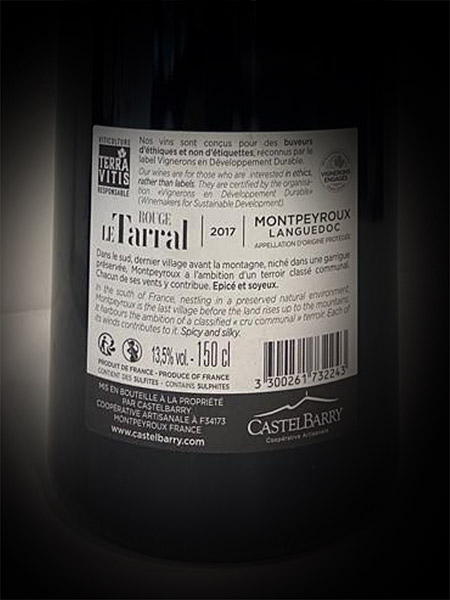 Terra Vitis is a certification created in Beaujolais in 1998 and as of today it gathers 7 associations from different regions of France. It accounts for 35 000ha of vineyards. Terra Vitis is an annual certification that encompasses 80 key control points that focus on sustainable vineyard management practices: reducing water consumption, using organic farming methods, and recycling waste.
Terra Vitis is a certification created in Beaujolais in 1998 and as of today it gathers 7 associations from different regions of France. It accounts for 35 000ha of vineyards. Terra Vitis is an annual certification that encompasses 80 key control points that focus on sustainable vineyard management practices: reducing water consumption, using organic farming methods, and recycling waste.
- Integrated Pest Management
- Social Responsibility: staff (Personal Protective Equipment) and consumer health
- Anticipation of future concerns, such as waste managemen
- Exploring alternative chemical products and monitoring the impact on surrounding neighborhoods
IMPORTANT FACT: Terra Vitis is the only label in France setting limits for CMR substances (Carcinogenic Mutagenic Toxic for Reproduction).
HVE – Haute Valeur Environnementale
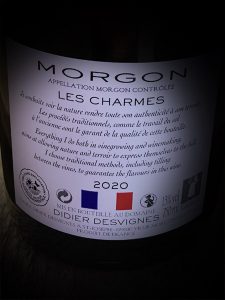
FAIR’N GREEN
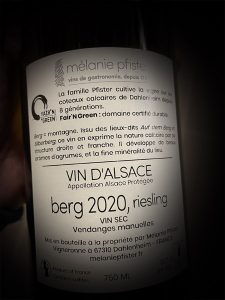 Fair’n Green is a certification of sustainability created in Germany in 2013 designed for producers as well as wine seller companies. It includes an analysis of the entire value chain: sourcing, viticulture, cellaring and sales.
Fair’n Green is a certification of sustainability created in Germany in 2013 designed for producers as well as wine seller companies. It includes an analysis of the entire value chain: sourcing, viticulture, cellaring and sales.
The auditing goes through the following:
• Environmental protection and natural viticulture
• Promotion of biodiversity
• Protection of natural resources
• Fair wages and social commitment
• Social responsibility
• Preservation and promotion of the cultural landscape.
The comprehensive consulting examines 150 criteria among which is the calculation of carbon footprint and a life cycle assessment.
VIGNERONS ENGAGES
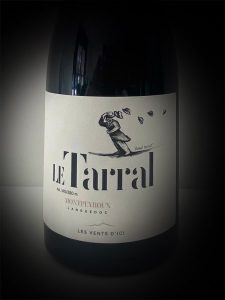
AGRICULTURE BIOLOGIQUE
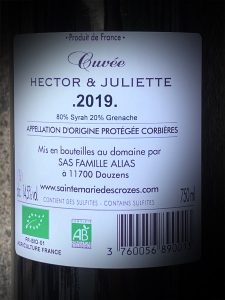 Agriculture Biologique is a French label for organic agriculture created in 1985. The regulations for this certification are much stricter than in the United States, where wine can be certified as organic if it is made from grapes that were grown without synthetic pesticides or herbicides, and without using most conventional fertilizers.
In France, to receive the label “Agriculture Biologique” a wine must not only be made from organically grown grapes, but also from organic must (the juice of the grapes that has not been fermented into wine), and it must be bottled and sealed with an organic seal.
The label “Agriculture Biologique” is shown here.
To help prevent systemic industrial chemical input in the vineyard, it was integrated into the European label shown to the right in 2012 for the wine industry.
It has been challenged by other labels since, for example, the European label tolerates 0.9% of GMO in the final product.
Agriculture Biologique is a French label for organic agriculture created in 1985. The regulations for this certification are much stricter than in the United States, where wine can be certified as organic if it is made from grapes that were grown without synthetic pesticides or herbicides, and without using most conventional fertilizers.
In France, to receive the label “Agriculture Biologique” a wine must not only be made from organically grown grapes, but also from organic must (the juice of the grapes that has not been fermented into wine), and it must be bottled and sealed with an organic seal.
The label “Agriculture Biologique” is shown here.
To help prevent systemic industrial chemical input in the vineyard, it was integrated into the European label shown to the right in 2012 for the wine industry.
It has been challenged by other labels since, for example, the European label tolerates 0.9% of GMO in the final product.
BIODYVIN
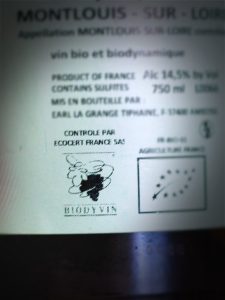 The French Biodynamic Association (ABD) created the certification Biodyvin in 1992. This certification is based on the principles of biodynamics, a sustainable agriculture movement that was started by Rudolf Steiner in 1924.
Biodynamics believes that plants and animals are interconnected, and that farming should be done in harmony with the natural world. It also believes that agriculture should be self-sustaining and that it is important to use practices that will not damage the land or the environment.
To receive the Biodyvin certification, a wine must be made from biodynamic grapes, and must be bottled and sealed with a Biodyvin seal. The label Biodyvin is shown here.
In addition to sustainable viticulture, biodynamics also focuses on the holistic health of the vineyard and the winemaker’s role in shaping the flavor of the wine. It gathers 192 estates first and foremost in France, but also in Germany, Belgium, Italy, Portugal and Switzerland.
The group of producers asks ECOCERT France to check if the members respect the rules and then delivers a certifying auditing on biodynamic practices in the vineyard and in the winery.
A 4-year conversion to biodynamic certification is monitored by SHIV CBD (Syndicat International des Vignerons en Culture Biodynamique/International Union of Biodynamic Growers).
The French Biodynamic Association (ABD) created the certification Biodyvin in 1992. This certification is based on the principles of biodynamics, a sustainable agriculture movement that was started by Rudolf Steiner in 1924.
Biodynamics believes that plants and animals are interconnected, and that farming should be done in harmony with the natural world. It also believes that agriculture should be self-sustaining and that it is important to use practices that will not damage the land or the environment.
To receive the Biodyvin certification, a wine must be made from biodynamic grapes, and must be bottled and sealed with a Biodyvin seal. The label Biodyvin is shown here.
In addition to sustainable viticulture, biodynamics also focuses on the holistic health of the vineyard and the winemaker’s role in shaping the flavor of the wine. It gathers 192 estates first and foremost in France, but also in Germany, Belgium, Italy, Portugal and Switzerland.
The group of producers asks ECOCERT France to check if the members respect the rules and then delivers a certifying auditing on biodynamic practices in the vineyard and in the winery.
A 4-year conversion to biodynamic certification is monitored by SHIV CBD (Syndicat International des Vignerons en Culture Biodynamique/International Union of Biodynamic Growers).
ECOCERT
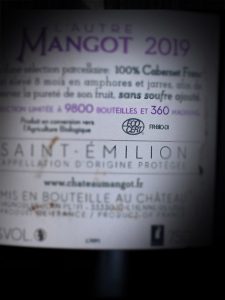 Ecocert is a certification agency operating in 130 countries since the 1990’s and auditing organic agricultural practices to ensure validity for a label certification such as Biodyvin above.
The agency has created an environmental charter, which wines must comply with for different levels of sustainable production including organic, fair trade, sustainable wine and carbon-neutral.
Ecocert is a certification agency operating in 130 countries since the 1990’s and auditing organic agricultural practices to ensure validity for a label certification such as Biodyvin above.
The agency has created an environmental charter, which wines must comply with for different levels of sustainable production including organic, fair trade, sustainable wine and carbon-neutral.
DEMETER
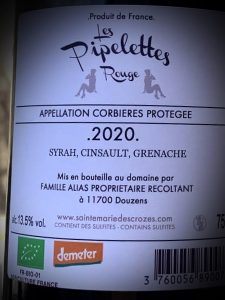 The Demeter Association was founded in 1928 and is the world’s oldest sustainable agriculture organization. It focuses on biodynamic agriculture, which we talked about earlier. The biggest difference is the scale. Demeter is an international certification and includes other agricultural products.
The Demeter Association was founded in 1928 and is the world’s oldest sustainable agriculture organization. It focuses on biodynamic agriculture, which we talked about earlier. The biggest difference is the scale. Demeter is an international certification and includes other agricultural products.
To receive the Demeter certification, a wine must be made from biodynamic grapes, and must be bottled and sealed with a Demeter seal.
The label Demeteris shown here.
Like Biodyvin, Demeter believes that agriculture should be sustainable and that it is important to use practices that will not damage the land or the environment. Demeter also believes in holistic farming, which takes into account the health of the soil, the plants, and the animals.
The Demeter Association has a number of certifications, which are shown here:
• – Biodynamic Agriculture
• – Certified Organic Farming
• – Fair Trade
• – Sustainable Winegrowing
CARBON NEUTRAL WINE
In order to reduce environmental impact, some winemakers have started becoming carbon neutral. This means that they have calculated the amount of greenhouse gases their business produces and have offset those emissions by planting trees or investing in renewable energy projects. To receive theCarbon Neutral Wine certification, a wine must be made from sustainable grapes, and must be bottled and sealed with a Carbon Neutral Wine seal. The label Carbon Neutral Wine is shown here. Currently, there are only a few winemakers who have received this certification, but it is something to watch for in the future.AVN – Association des Vins Naturels
An association created in 2005 in the Loire valley to promote wines produced under organic or biodynamic certifications made with no other additives than a maximum of 10mg/l of SO2 (sulfur dioxide) for red wines and 20mg/l for white wines at bottling stage.S.A.I.N.S.
Sans Aucun Intrant Ni Sulfites Ajoutés
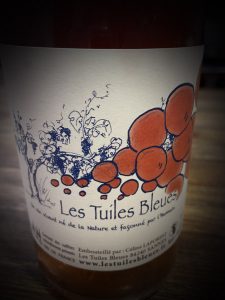 An association founded in 2012 in the Mâconnais to gather under their label producers that work with no additives at all other than natural products in the vineyard.
An association founded in 2012 in the Mâconnais to gather under their label producers that work with no additives at all other than natural products in the vineyard. Sulfur dioxide addition is not allowed for members.
No organic certification or biodynamic certification is mandatory to take part but practices must be in line with the requirements above.
In closing, there are a number of different French certifications and labels that you should be aware of when looking for sustainable wine. Those above are the most important. At Murielle Claudel Wines we see our role in sustainability as just as significant as in the vineyard. This is why we work directly with producers and importers who share the same values. Together we bring you wine from sustainable, organic and biodynamic vineyards.
